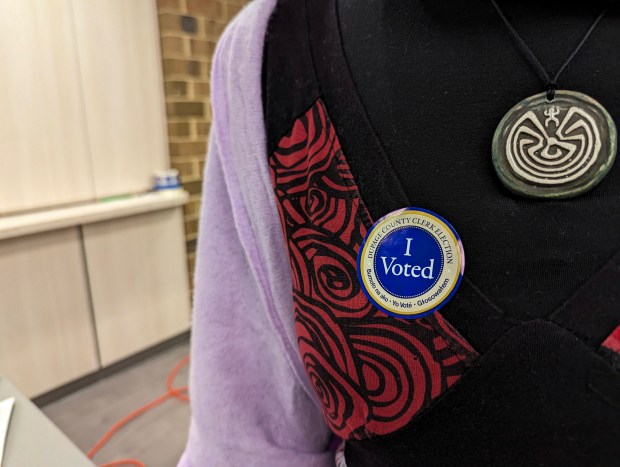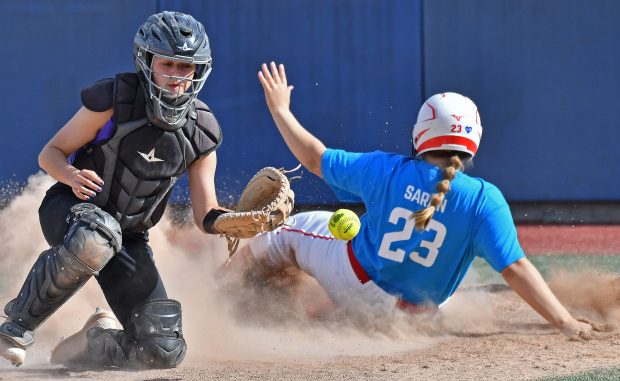As was the case for Election Day turnout across the Chicago area, primary voters in DuPage and Will counties showed up in meager numbers Tuesday.
With very few contested local races — and the major presidential candidates for the November general election effectively chosen — county officials weren’t surprised.
“Obviously, like any election, voters come out when there are races and issues that they care about,” said Adam Johnson, chief deputy of the DuPage County Clerk’s Office. “You know, the more contested races, the more hot button issues on the ballot, the more voters who are motivated to come out.”
DuPage saw about 20% of registered voters cast ballots in Tuesday’s primary as Thursday. There are still some ballots left uncounted, including those still in the mail that can be received up to two weeks after Election Day as long as they are postmarked March 19. What they’ve received so far has been counted, Johnson said.
The last time DuPage reported similar primary turnout in presidential election year was in 2012. Over the past two decades, though, the number of residents opting to vote has been up and down.
In 2004, when Democratic Sen. John Kerry challenged President George W. Bush, about 27% of registered voters flocked to the polls for DuPage primaries, according to Chicago Tribune archives. Four years later, as Barack Obama vied for the Democratic nomination in his first presidential bid, primary turnout in DuPage jumped to 43%.
But by 2012 — a presidential reelection year, like 2024 — turnout dropped back down to just over 20%. Engagement more than doubled in 2016, however, as both Donald Trump and Hillary Clinton vied for their parties’ nominations. And in 2020, despite a primary shadowed by the early days of the COVID-19 pandemic, about 25.5% of DuPage voters cast ballots.
Now, with President Joe Biden and Trump virtually assured the nominations of their parties, there wasn’t a contested presidential primary to drum up engagement, Johnson said. Individual local races can pique interest community to community, he added, but going into Tuesday, there wasn’t much on DuPage voters’ ballots to amplify participation.
Democrats only had two contested primary races in DuPage this week for coroner and recorder. On the Republican side, there were no contested primaries for any countywide positions.
As for congressional primaries, there were a handful of competitive races for DuPage voters, including in the 11th Congressional District, where Democratic U.S. Rep. Bill Foster, of Naperville, ultimately defeated civil rights attorney Quasim Rashid.
But while Tuesday featured scant challenge, the primaries have set up for a “pretty heavily contested election environment” in the fall, with nominees from each party in most races, Johnson said.
“We would expect very high turnout for the same reasons turnout was low for the primary: hotly contested races that people are very motivated to come out and vote for,” he said.
It’s hard to predict what the general election will bring but Johnson said the DuPage County Clerk’s Office is preparing “as if it’s going to be on the high level of turnout.”
“We have expanded the number of early voting locations, and we’re really promoting the vote-by-mail program,” he said.
Early voting and mail-in ballots were slightly up this year, compared to 2020’s primary, Johnson said, adding that it was really Election Day voting that was “down quite a bit.”
Region-wide, DuPage voters were in good company as the Chicago-area overall posted tepid turnout. But comparatively, even DuPage’s lower numbers were on the high end of turnout county to county. As of latest unofficial results Friday, turnout in suburban Cook and collar counties were as follows: 11.7% in Lake County; 15.1% in Kane; 15.5% in Will; 17.5% in McHenry; and 17.6% in suburban Cook.
Even in the city of Chicago, as of numbers updated Thursday, turnout was 22.9% despite contested congressional races, an expensive Cook County state’s attorney’s matchup and a rare referendum.
Johnson chalked up DuPage’s regionally stronger turnout to the clerk’s office putting a concerted effort towards making voting as accessible as possible, he said.
“We really do try to make it easy … for anyone who wants to vote to be able to vote so I think that partially contributes to our turnout being on the higher end compared to, you know, other local jurisdictions,” he said.
Like DuPage, Will County had few contested races to draw voters out on Election Day, said County Clerk Lauren Staley-Ferry. Speaking to their 15.5% turnout — down from 24.5% in 2020 and 44.8% in 2016 — Staley-Ferry said that while “we weren’t surprised,” her office had hoped it was going to “creep up and creep up and creep up” as Tuesday went on. It just didn’t.
Echoing Johnson, Staley-Ferry said she thinks November’s general election “is the election that people will come out for.”
One takeaway from Tuesday’s primary Staley-Ferry was eager to report was that new voting equipment put in ahead of this year’s elections was a success.
“It’s been quite the lift, but we had a ton of great feedback from our judges and the voters,” she said, adding that with the equipment’s success, her office feels “even more prepared” going into November.
Asked about mail-ins and early voting, Staley-Ferry said, “We’re seeing small increases every election” because “going in on Election Day is tough.”
But lackluster turnout and alternatives aside, Staley-Ferry maintained Election Day voting is a tradition.
“I hear it from a lot of people, that (voting on Election Day) is something (people) do with their family, their spouse, whatever the case may be,” she said. “There are still our traditionalists out there that love (it).”
Giving residents every opportunity to vote, whether it’s in person on the big-day or ahead of time, is important to Staley-Ferry and her office, she said, because “it’s the most important thing that we do, right? As a citizen and as a voter.”




